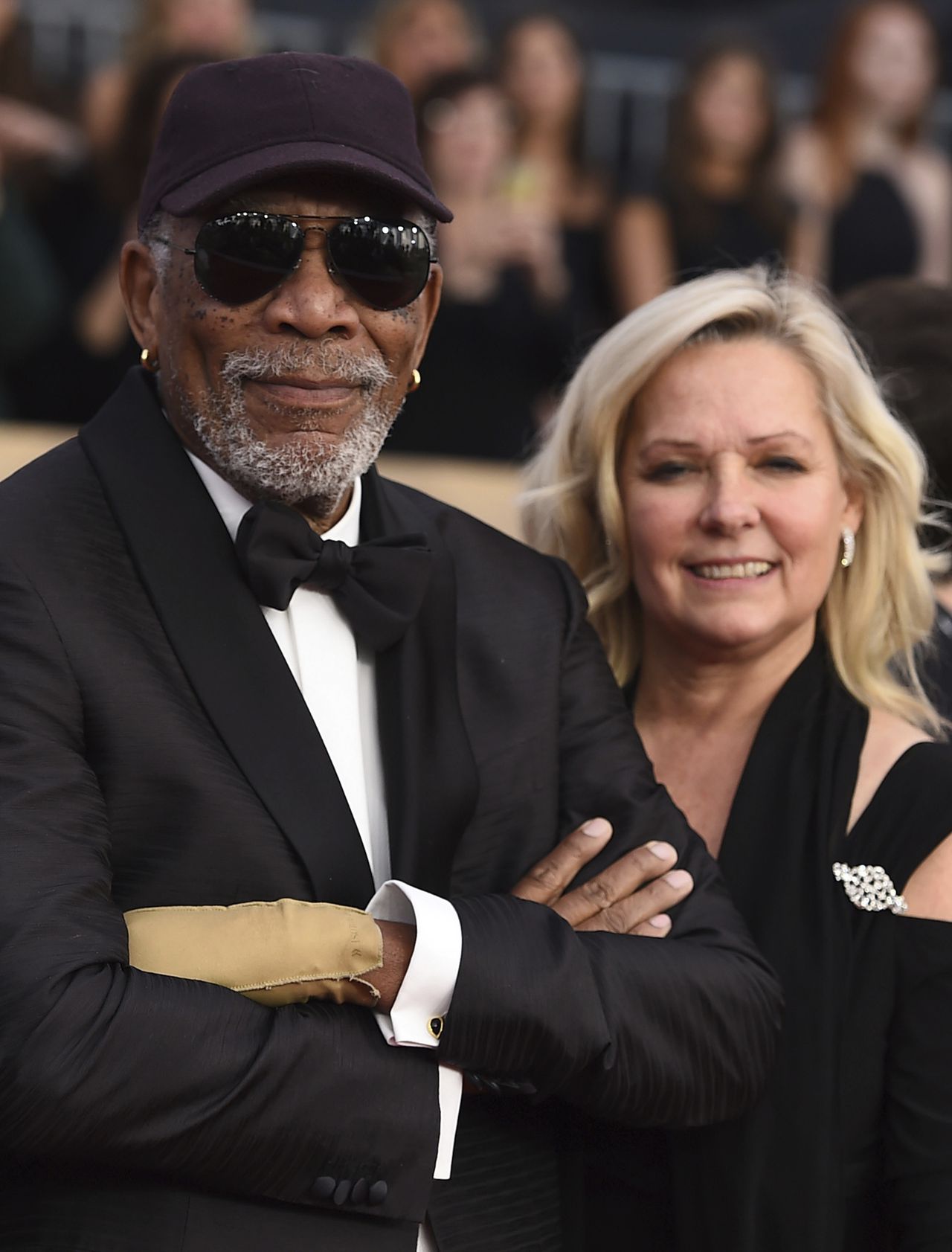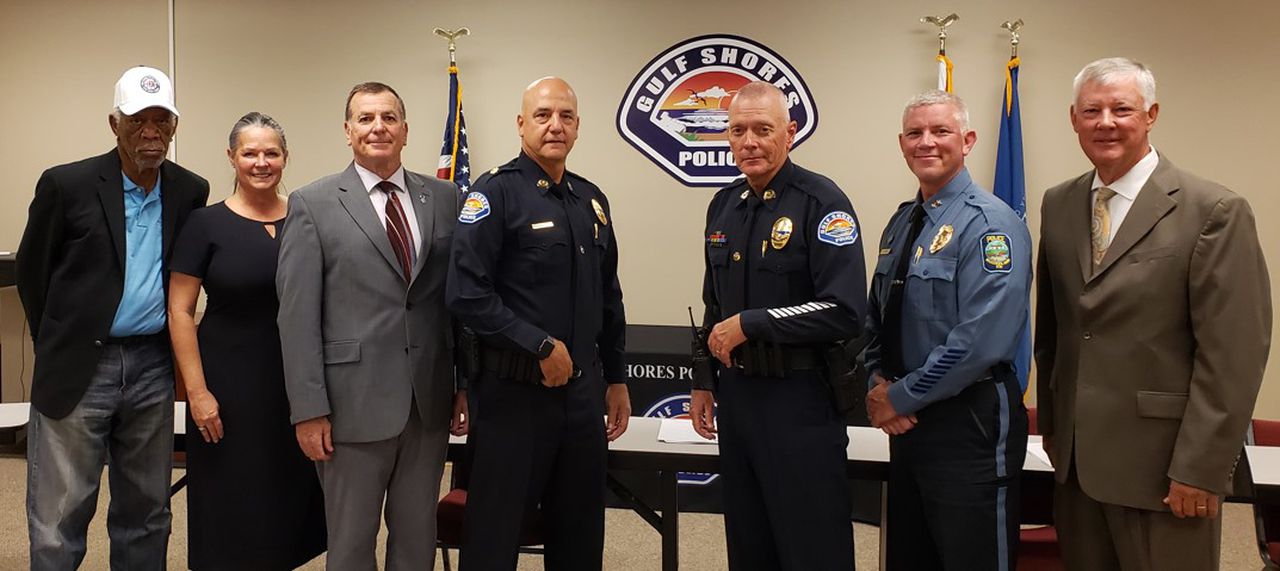How Morgan Freeman found his way to a Gulf Shores police panel
“What was the last book you read?” is one of the questions Gulf Shores Police Chief Ed Delmore remembers a police recruit being asked during a recent interview in front of the panel he assembled to screen police officer hopefuls.
The recruit’s response: “11/22/63,” by Stephen King.
The recruit then turned toward the celebrity on the panel and gave a somewhat smart aleck response: “Sorry sir that you weren’t in it,” Delmore recalls.
Related:
The celebrity then leaned in slowly and responded in his iconic and unmistakable voice with a response that trumped the recruit with a much better-known King novel: “I was in Shawshank Redemption.”
“When a candidate walks into the room and they haven’t been clued in any way that he’s there, I would say there are varying degrees of shock,” Delmore said.
Morgan Freeman, the Oscar-winning actor, is a member of a Gulf Shores police panel charged with screening police recruits.
Freeman might be the celebrity among the group, but the panel is a list of impressive resumes that includes retired Marine Sgt. Major Bryan Battaglia, who served as senior enlisted advisor to the chairman of the Joint Chiefs of Staff, and David Bass, a retired assistant sergeant at arms of the U.S. Senate.
“There are no slouches on this panel,” said Delmore. “The panel is impressive when we include all of these people and then you add Morgan Freeman.”
Finding Freeman
So how did the famed actor end up on a panel screening police hopefuls in an Alabama beach city of 15,700 residents?
Delmore said it’s a somewhat convoluted story. He said that Bass introduced Delmore to Linda Keena, an associate professor of criminal justice and Legal Studies at the University of Mississippi.
“I said, ‘we’d love to have her’ (serve on the panel),” Delmore recalls telling Bass. Keena and Freeman are philanthropic partners, who spend time in Gulf Shores. Keena also once worked at Missouri State University and as a probation and parole office.
“One day, she was scheduled to be on the interview panel, and she said, ‘would you like Morgan to participate?’” Delmore recalled. “We said, ‘absolutely.’ They are both Gulf Shores residents, at least part-time, and this is a way for them to give back to their local community and select good candidates (to the police department).”
Actor Morgan Freeman (l.) helped the Gulf Shores Police Department select its newest police officer as he participated in the panel interviewing the candidates on Friday.
Freeman and Keena participated in the more recent panel, which screened candidates on January 27. According to Delmore, it was the second time Freeman was a participant. He also joined the panel in screening candidates in October 2021.
“I don’t look at him as a novelty to this thing,” said Curt Graff, a retired police lieutenant from the Southern Illinois Enforcement Group, a drug enforcement agency based in Carbondale, Illinois, and who is also a member of the panel. “He’s an active participant on the panel. He asks his questions. We all rate the applicants after the oral interviews are over. His rankings are consistent with the rest of our rankings.”
Freeman, through his agent, declined to comment.
Grueling day
The panel’s work is part of what Delmore and Graff say is a grueling day of testing for the police recruits. It begins around 7:30 a.m. with an orientation followed with physical agility tests that include testing pushups, sit ups, and a 1-1/2-mile run followed by a 300-meter untimed swim at the Bodenhamer Center. If the recruits past the physical tests, they will break for lunch and then return for a written exam. If they pass the written exam, they will arrive to the panel interviews. That occurs around 3 p.m.
Few applicants get hired to the Gulf Shores Police Department. Unlike larger agencies elsewhere in the U.S., the Gulf Shores Police Department is a sought-after job that draws interested police recruits from around the country seeking a job in a beachside city.
“Typically, we’ll have for Gulf Shores, well over 100 people applying,” Delmore said. “The last time, it was 120 applying. We’ll invited 50 to 60 to come take the exams. For a variety of reasons these days, only about 15 to 20 will come to participate. In some cases, they have a military obligation and cannot get off work or are not in position to make the trip.”
Delmore said that around 15-20 will participate in the testing and sit before the panel. Afterward, only one or two will be offered a position.
The process occurs about twice a year, Delmore said.
“We’re just very selective,” he said. “We have the ability to be that way. We are not in dire straits like a lot of other departments are.”
He added, “This is not a gimmick. It’s a very difficult and stressful process and it’s meant to be that way. If a candidate cannot take the stress of this process and an interview (from the panel), then they can’t take on the stress of police officer.”
Graff said that recruits often end the day exhausted.
“They are already tired (by the time they meet with the panel),” he said. “They are nervous. This is a big deal to them. They are trying to start a career in law enforcement. And then he’s there.”
Citizen of the area
Freeman, a Memphis native who grew up in Mississippi and is a 1955 graduate of Broad High School in Greenwood, is best known for his portrayal of beloved silver screen characters in movies that span the decades: Joe Clark in 1989′s “Lean on Me,” Hoke Colburn in 1989′s “Driving Miss Daisy,” Ellis Boyd “Red” Redding in 1994′s “Shawshank Redemption,” William Somerset in 1995′s “Seven,” Eddie “Scrap Iron” Dupris in 2004′s “Million Dollar Baby,” Lucious Fox in multiple Batman movies, God in 2004′s “Bruce Almighty” and again in 2007′s “Evan Almighty, and Nelson Mandela in 2009′s “Invictus.”
He’s been a director and, of course, a powerful screen narrator whose voice is considered among the most recognizable in Hollywood history.

Morgan Freeman and Linda Keena arrive at the 24th annual Screen Actors Guild Awards at the Shrine Auditorium & Expo Hall on Sunday, Jan. 21, 2018, in Los Angeles. (Photo by Jordan Strauss/Invision/AP)Jordan Strauss/Invision/AP
Freeman and Keena, in recent years, have expressed interest in supporting policing. They donated $1 million in 2021 to establish the Center of Evidence-Based Policing and Reform at Ole Miss.
“It’s time we are equipping police officers with training and ensuring ‘law enforcement’ is not defined only as a gun and a stick,” Freeman said, according to an article about the donation on the Ole Miss News site. “Policing should be about that phrase, ‘To Service’ found on most law enforcement vehicles.”
Related: Morgan Freeman’s 10 best movies ranked
In Gulf Shores, Morgan’s service is similar to his other panelists – as a volunteer. His picture does not stand out on the Gulf Shores Police Department’s Facebook page. He posed with his fellow panel members in a picture posted last week to Facebook. While other panelists cracked a smile, Freeman posed with a serious and business-like look on his face.
“I will say this, he’s a very nice man and he conducts himself like everyone else on this panel like a professional,” Delmore said. “But a friend of mine once asked, ‘Does he use his God voice?’ Of course, he’s played God before. My response was, ‘does he have any other?’”
Said Graff, “He’s basically just there as a citizen of the area. He just happens to be Morgan Freeman.”
